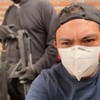Luis Edgar Herrera “Tolín”, an alleged Sinaloa Cartel lieutenant in Baja California, signals from inside his police cell following his arrest this weekend. Photo: Baja California State Police.
A tense standoff between Mexico’s army and cartel henchmen took place when the troops detained a regional cartel boss earlier this week. The soldiers refused to free Francisco Torres, “El Duranguillo’’, in Altar, Sonora, and an hourlong gunfight ensued, which ended up with one man dead and four soldiers wounded. Footage of the July 2 incident, taken by local residents and security cameras, showed a group of around 60 men blocking the roads with pick-up trucks and shooting at the soldiers. President Andrés Manuel López Obrador said in a press conference Tuesday that men offered the soldiers 10 million pesos (around half a million dollars) to let Torres go. They refused. A number of recent shootouts and arrests in Mexico are prompting some to ask if the president is backtracking on his promise to use hugs, not bullets, to bring down drug-trafficking and the violence around it. Another confrontation took place on the same day, this one between armed groups after an attempt on the life of Luis Edgar Herrera “El Tolín”, allegedly a boss for a faction of the Sinaloa Cartel in the northern cities of Mexicali and Rosarito in the state of Baja California, according to local press reports. When Herrera took his five-year-old son - who was allegedly injured in the exchange - to hospital he got into another gunfight with the Mexican Army and Baja California State Police before being arrested, authorities said. The latest, anti-narco operations in Mexico have become rare under Mexico’s President López Obrador, who vowed to use “hugs not bullets” to defeat organized crime when he came into power in 2018. But homicides continue to soar in Mexico, and the president is perceived by some as letting the cartels get away with murder. López Obrador was also criticized for shaking the hand of ‘El Chapo’s’ mother, María Consuelo Loera during the first Covid lockdown in Mexico. Following the two arrests on July 2, Mexican authorities detained a third cartel boss in the space of two days—this time it was Neri Ramírez “El Neri”, an alleged capo in the Mexican coastal city of Guaymas, Sonora. Authorities said Ramírez is behind several dozens of killings in the region. Operations by the armed forces against prominent cartel members have been rare since an incident known as the Culiacanazo in October 2019. Government forces detained but then were forced to release Ovidio Guzmán, the son of Joaquin “El Chapo” Guzmán in the Sinaloan capital, after they were outnumbered and outgunned by cartel henchmen. The incident was seen as an embarrassment for the government of López Obrador.The arrests this weekend point to a shift, according to security analyst Eduardo Guerrero, founder of intelligence firm Lantia. “López Obrador is having an important change of strategy and actually engaging in security operatives using force,” Guerrero told VICE World News. Guerrero noted that most of the recent apprehensions have been against a single cartel. “Up until last year the Mexican government was very much focused on fighting New Generation Jalisco Cartel, but starting this year the majority of the attacks have been against the Sinaloa Cartel,” he said. If the U.S. is pressing Mexico’s government to go hard against the Sinaloa Cartel, it comes at a time when diplomatic relations in anti-narcotics operations between the two nations are at a low.Earlier this year, Mexico’s government shut down an elite police unit that was trained and funded by the U.S. Drug Enforcement Administration to investigate drug cartels, claiming it was corrupt. It also removed a DEA plane from its territory.Matters began to go downhill in October 2020, when Mexico’s former Defense Chief General Salvador Cienfuegos was arrested on a trip to the U.S on charges that he worked with drug-traffickers. The move caused a diplomatic spat, and President López Obrador threatened to throw the DEA out of Mexico. The U.S backtracked, dropped the charges and sent Cienfuegos home. He was not charged with a crime in Mexico. “The U.S. has targeted the Sinaloa Cartel as a priority for being the criminal organization exporting the vast majority of the fentanyl found,” Guerrero said. Arrests also make the government look like it’s taking important measures, said another analyst. “The apprehension of a kingpin always results in a better perception from the people to the government in place, but this government has made it clear they are not going against the biggest leaders,” analyst Alejandro Hope told El País newspaper in a recent interview.Guerrero said that the pressure is on. “The Mexican government is finding itself forced to act because the insecurity in Mexico is now affecting everyone, all social classes, it is very widespread at this point.”
Advertisement
Advertisement
Advertisement
